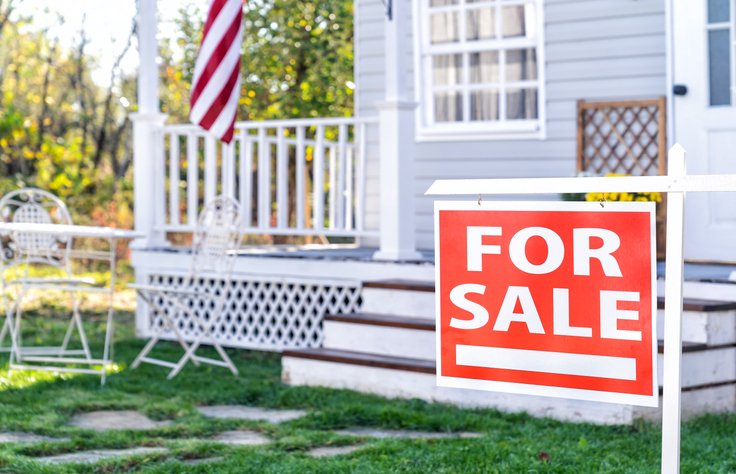
Most people don’t think about capital gains when they inherit a property, but at some point the issue of capital gains tax will need to be addressed.
But without proper planning ahead of time, capital gains taxes could take a big bite out of any profits when the home is eventually sold. Fortunately, there are several ways to avoid paying capital gains on inherited property.
Key takeaways
- Capital gains are the difference between the cost basis and the sale price of the property.
- The cost basis of a property is stepped-up to the fair market value on the date of the decedent’s death.
- Options for avoiding capital gains tax on inherited property include selling the home right away, turning the property into a rental, moving into the home as a primary residence, and disclaiming the inheritance.
How capital gains are taxed
Capital gains in real estate are taxed based on the difference between the property cost basis and the sale price of the property.
Cost basis includes the original purchase price of the property, plus most closing costs when the property was purchased and any capital improvements made over the holding period of the property.
According to the IRS, settlement fees and closing costs for buying a property that become additions to the cost basis include utility installation charges, surveys, title insurance, and legal and recording fees.
IRS Publication 946 defines capital improvements as an addition or partial replacement of the property that is a betterment to the property, restores the property, or adapts it to a new or different use. Examples of rental property capital improvements would be replacing a roof or converting a basement into an additional rental unit.

Calculating capital gains
Here’s a simple example of how capital gains are normally taxed.
Assume an investor bought a home several years ago for a purchase price of $120,000. Closing costs added to the cost basis were $1,500 and a new roof was installed at a cost of $10,000, increasing the property cost basis to $131,500.
If the property is sold for $200,000, the capital gain subject to tax would be $68,500 (excluding any tax deductible closing costs paid by the seller such as the real estate sales commission).
Long-term capital gains tax rates currently range between 0%, 15%, or 20%. Assuming the investor is in the middle income bracket for capital gains tax rates, is married and files a joint tax return, the investor would pay $10,275 in capital gains tax:
- $68,500 capital gain x 15% capital gains tax rate = $10,275
However, when a property is inherited, capital gains and taxes for the heirs are calculated differently.
Capital gains tax on inherited property
When a home is inherited, the cost basis of the property is stepped-up to the current value of the property at the time it is inherited. As the IRS explains, the basis of the property for the heir is the fair market value (FMV) on the date of the decedent’s death.
To illustrate, assume that instead of selling the home in the above example the property is willed to an heir when the investor passes away.
If the fair market value of the home was $200,000 at the time of the investor’s death, the new cost basis to the heir is also $200,000. That means the capital gain of $68,500 subject to tax that the investor would have had is eliminated for the heir.
Going forward, the stepped-up basis is used for calculating capital gains tax liability for the heir.

How to avoid paying capital gains tax on inherited property
There are four main ways to avoid paying capital gains tax when a property is inherited:
1. Sell inherited property as soon as possible
The first option for minimizing or even eliminating property gains tax on an inherited property is to sell it right away. If the heir receives the home with a stepped-up cost basis of $200,000 and turns around and sells the property for $200,000 there is no capital gain.
Sometimes people who inherit a home decide to hang onto the property for a few months before selling it. In situations like these, the capital gain subject to tax would be the difference between the stepped-up cost basis and the sale price.
For example, Zillow estimates that the typical value of a middle price tier home in the U.S. will increase by a little more than 12% over the next year (as of July 31, 2021).
Assuming the heir keeps the property for six months before selling it, the value of the home may increase by 6%, to a fair market value of $212,000.
If the inherited home is sold for that price, the capital gain subject to tax would be $12,000, which is the difference between the stepped-up cost basis of $200,000 and the market value of $212,000.
Note that if the inherited home is owned for one year or less before being sold, the capital gain would be short-term and taxed as regular income to the heir. If the heir holds the property for more than one year, the long-term capital gains tax rate would be 0%, 15%, or 20%, depending on the heir’s income bracket for capital gains tax rates.
Of course, home prices can go down as well as up. If the inherited property was sold for less than the cost basis, there would be no capital gain subject to tax.
2. Turn the inherited home into a rental property
Sometimes people who inherit a home decide to keep it and turn the home into a rental instead of selling it right away. Given the current demand for single-family rental homes, it’s easy to understand why making an inherited home a rental might be the right choice for some heirs.
According to the most recent single-family rental investment trends report from Arbor Realty Trust, record demand for single-family rental homes is sending rents and values soaring. Occupancy rates have risen to over 95%, and vacant-to-occupied rent growth accelerated to a record high of 12.7%.
While there may be money to be made by turning an inherited home into a rental property, there are also some potential challenges as well, especially if the heir lives in a different city than the place the rental property is in.
Many people who own real estate remotely hire a local property manager to take care of the day-to-day details that come with owning a rental property. A good property manager will:
- Handle tenant emergencies and conduct routine inspections to catch minor issues before they become big.
- Coordinate any needed repairs and maintenance using a cost-effective network of trusted handymen and contractors.
- Screen prospective tenants, sign a lease, collect rent, and enforce the terms and conditions of the lease agreement.
- Keep an open line of communication with the property owner, tenant, and contractors to address any matters as soon as they come up.
- Manage the financial performance of the home by taking care of bookkeeping, generating monthly reports such as the income statement and net cash flow report, and preparing for year-end tax filing with the state and IRS.
- Run rent comparables before renewing the lease with the current tenant or finding a new tenant, to help ensure that the rental property is generating the highest possible return.
If at some point the inherited home turned rental property is sold, the heir would be taxed on the capital gain between the stepped-up cost basis when the home was inherited and the sale price of the property.
However, because the home was used as a rental, the heir could choose to defer paying taxes by conducting a 1031 tax deferred exchange to sell one rental property and purchase another.
3. Use the inherited property as a primary residence
The third option to avoid paying capital gains tax on an inherited property is to move into the home and use it as a primary residence. When the home is eventually sold, homeowners can generally exclude $250,000 in capital gains from tax or up to $500,000 in capital gains from tax if a joint return is filed with a spouse.
However, turning an inherited property into a primary residence must meet the IRS test to qualify for the exclusion.
In order to be eligible for a capital gains tax exclusion, a homeowner must have owned and used the home as a primary residence for a period aggregating at least two years out of the five years prior to the date of the sale.
In general, a homeowner is not eligible for the exclusion if the capital gain from the sale of another primary residence was excluded during the two-year period prior to the sale of the inherited home that was turned into a primary residence.
4. Disclaim the inheritance for real estate tax purposes
Instead of turning an inherited property into a rental or moving into the home as a primary residence, some investors opt to disclaim the inheritance completely.
When an inheritance is disclaimed, the property would go to the next person in line to inherit the home. While disclaiming an inheritance can eliminate having to pay any capital gains tax, the decision to disclaim is final and the heir can not change his or her mind after the fact.
Final thoughts on this topic
When everything is said and done, most heirs are able to avoid paying capital gains tax on inherited property, or at least keep capital gains tax to a bare minimum.
Some heirs may choose to sell right away, or to move into the inherited home. Others turn the inherited home into an investment property with the goal of generating rental income, having the home increase in value over the long term, and harvesting the tax benefits that real estate investors enjoy.


